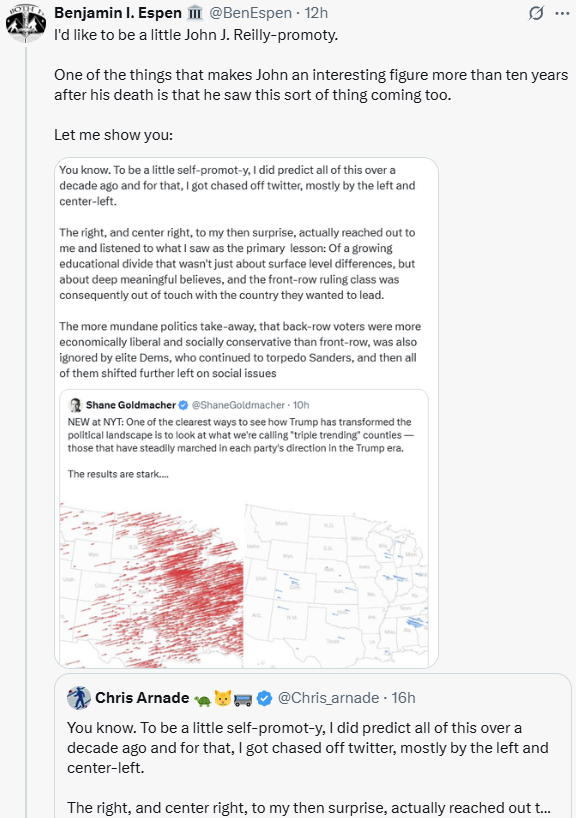The Long View: The New Absolutes

This twenty-year old essay is topical this week, with the defenestration of James Damore from Google. I've said several times that the cultural Left won the culture war in the United States, at least insofar as they hold more power to impose their ideas than the Right at present. Yet it seems that the culture war isn't over.
The New Absolutes
by William D. Watkins
Bethany House Publishers, 1996
$19.99, 319 pages
ISBN 1-55661-721-6
The Bohemian Mandates
Garrison Keillor once characterized the United States as a nation founded by religious zealots who wanted to practice religious intolerance to a degree forbidden by the laws of England. While this is perhaps a churlish formulation of the matter, nevertheless it is the case that one of the defining features of American culture has always been a tendency to moralize issues and then to impose the morals by social coercion and, ideally, by statute. Colonial tax resistance, Abolitionism (of slavery), Prohibitionism (of liquor), anticommunism, feminism, the anti-smoking campaign: the roll-call of movements and causes designed to make people be good would make a serviceable backbone for any general narrative of American history.
On the whole, this is not a bad feature for a country's culture to have. Though it has produced undesirable results occasionally (such as the Civil War), it has also added a dynamic quality of self-searching and radical reform to American history that has usually redounded to the nation's benefit. "Usually" is the key word here, since the ancient puritan reflexes have now and again been exercised in the service of causes that would have appalled the Puritans themselves. This is the situation in many areas of national life today, when causes like homosexuality, abortion and euthanasia are being promoted by the leaders of key institutions with all the fervor and moral certainty of John Brown and Carrie Nation.
This list of non-negotiable ethical propositions that began to be institutionalized in the 1970s is what William Watkins (who among other things is a member of the Advisory Board of "Culture Wars") calls "The New Absolutes." By his count there are ten of them, which he contrasts with ten traditional "absolutes" of forty years ago. The contrast of the old with the new is not necessarily that of the good with the bad. Before the civil rights movement, for instance, typical American folkways had it that "All white people are created equal and should be treated with equal dignity and respect," a position on which later decades have brought improvement, despite the moralization of affirmative action programs and the new dogma that all white people have been historically privileged. Most of the new absolutes, however, such as the principles that "religion is the bane of public life" or that a "family is any grouping of two or more people," are experienced by the vast majority of the population as alien and oppressive, without any redeeming characteristics.
A lot of this book is a critique of cultural relativism. Watkins touches briefly on the logical problems of relativism, but is most concerned with the indubitable fact that, at least as it finds lodgment in law and academic curricula, relativism is a bit of a hoax. There is probably a great deal of honest stupidity among the professoriate when it comes to cultural anthropology. (The bold-faced liars are more likely to be found among the professional philosophers.) They really do think that the accounts of Central American Indians devised by French Marxists are about Central America, and they really do think that "Coming of Age in Samoa" is about Samoa. Though matters are no doubt different among working anthropologists, the popular academic use of anthropology elides the fact that the discipline is itself as Western as doilies on tea trays, and was invented by people looking for a barbarian foil to use in their critique of civilization.
Relativists rarely if ever question traditional moral and intellectual structures for the disinterested purpose of seeing where the inquiry leads. Anyone who has ever been in an institution whose leadership started talking about diversity and "hearing other voices" knows well enough that relativism is normally just a rhetorical device for pushing a progressive agenda that is remarkably uniform across the government and the academy and the media. Watkins uses the term "The New Tolerance" for this rhetorical technique. It is a significant corruption of what once had been a noble word.
Tolerance used to mean enduring certain characteristics or behaviors in others of which you personally might disapprove, but which courtesy or respect forbid you from trying to suppress. Religious tolerance normally falls into this category. It has often been argued, perhaps rightly, that it appeared in Europe in the 17th century simply because the continent had been exhausted by religious wars. In the Puritan tradition of America, there was also the conviction that you cannot save a man by compelling him to worship in a manner contrary to his conscience. In either case, the old tolerance was a mechanism for maintaining social peace, not fomenting cultural revolution.
The New Tolerance, in contrast, knows nothing of either courtesy or respect, and it seeks out occasions for confrontation. It requires that active accommodation and even approval be given to things to which you may well have principled objections. This kind of "tolerance" brings a sword rather than peace. Often supported by civil litigation and even criminal prosecution, it is the chief mechanism whereby real intellectual and cultural variety is marinated into the unsalted mush that is marketed under the name of "diversity." The New Absolutes seek to create a degree of conformity at least as strict as that contemplated by Puritan sumptuary laws.
To me, at least, the most interesting thing about the New Absolutes is that they are not arbitrary. Neither are they universal, in the sense of being products of universal human desires set free from traditional constraints. Their specific content, including such things as their feminism, their hostility to family, their superficial interest in foreign cultures, their obdurate socialism, have been staples of Bohemian life in the West since at least the 18th century. While you may, if you like, characterize some or all of these things as degenerate forms of traditional ideas, still not every society that goes to hell in a handbasket takes quite this route. They are not the vices of exhaustion. Some elements of the New Absolutes are as difficult to maintain in practice as the sternest features of traditional morality. They also, oddly enough, are often much more parochially Western than the values they seek to replace.
Take, for instance, the campaign to normalize homosexuality. The transition of the love that dare not speak its name to the love that will not shut up is one of the most disconcerting developments of the past half century. Homosexuality has become a lifestyle, a politics, even an ontology for some people. However, in my opinion at least, the whole thing is to some extent a collective hallucination. While sodomy has no doubt always been with us, there were no homosexuals until about 150 years ago, when people who defined themselves this way began to be a feature of metropolitan life in German and English-speaking countries. (Though not, of course, using the term "homosexual," which dates from about 1910.) To see the transition over the course of the nineteenth century, you need only compare the different ways that history regards Lord Byron at its beginning and Oscar Wilde at its end, despite the fact their personal habits were allegedly rather similar.
What we are dealing with here is not an ancient minority, much less the phenotype of a genotype, but rather an exotic variety of culturally conditioned personality. A good analogy to the homosexual might be the neurasthenic, who appeared at about the same time but did not make it much past the beginning of the 20th century. Odd as it may sound today, there is no reason to think that homosexuality will be a permanent feature of the cultural landscape (indeed, in light of its epidemiological effects, there is reason to think otherwise). It is entirely conceivable that there will be as few homosexuals in 2050 as there were neurasthenics in 1950. Stranger things have happened. Just lately.
If America were really suffering from moral entropy, there would be nothing to be done about it. On the basis of no personal experience, this is the impression I get of most of Europe. The great cities are becoming immaculately-maintained museums whose intellectual life is a post-modern Glass Bead Game. Politics is collapsing into the social services. The pathologies of the continent, both cultural and economic, really are vices of exhaustion. The European Union is starting to look like the lowest energy state of a closed system, the sort of situation that in physics admits of no remedy.
On the basis of at least some personal experience, I would say this is not the case in America. The wires are still live in the United States. The New Absolutes are fiercely-held dogmas, forcefully defended against a growing coalition of their equally energized opponents. Even the current disorders on the conservative side of the spectrum are signs of life. In any case, we should remember that no political party or platform is wholly coincident with the work of moral restoration.
Between the world of the New Absolutes and that of ordinary human life there is only limited occasion for the play of synthesis and antithesis. The cultural history of the United States has not been one of gradual transitions, but of sudden flips, like a huge iceberg turning over. Such events may take as little as a decade to accomplish. One suspects that the America of the New Tolerance will go under far more quickly than it took to rise. We have yet to determine whether what follows it will be better or worse.
Copyright © 1997 by John J. Reilly

The New Absolutes By William D. Watkins



Comments ()